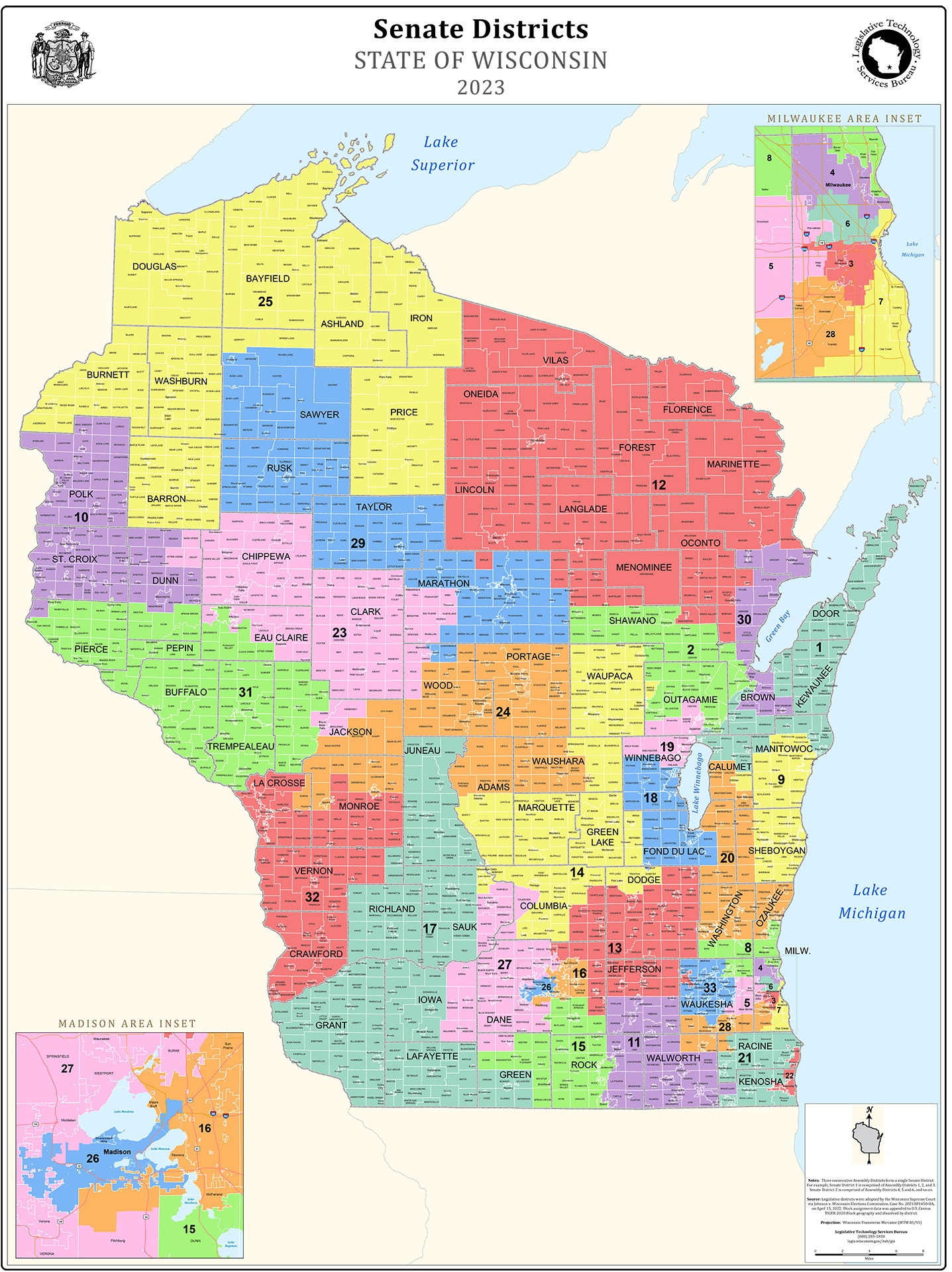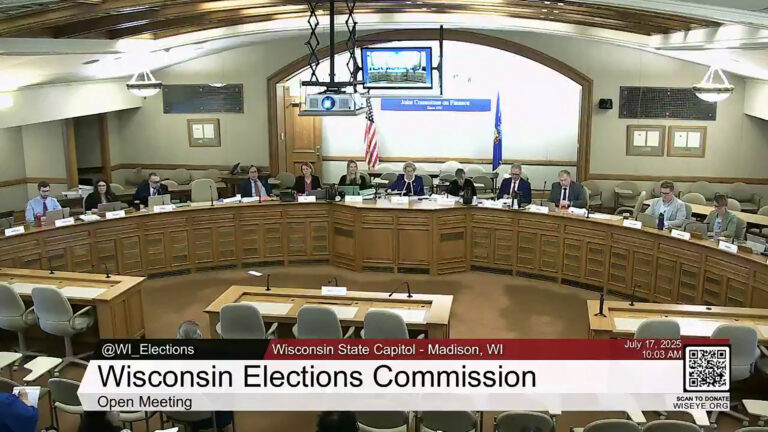Democrats are unlikely to win full control of the Wisconsin Legislature in 2024 — with one exception
The Wisconsin Supreme Court appears set to enact more competitive legislative maps soon, but only one set of districts being considered might allow Democrats to win a legislative majority if they win a majority of the vote in the November 2024 election.
The Badger Project
February 12, 2024

A skylight illuminates the view for observers who fill the upper-level gallery of the Wisconsin State Senate chamber during a floor session on Sept. 14, 2023. (Credit: PBS Wisconsin)

Politically debilitated since 2011 by what many experts call some of the most flagrant gerrymandering in the country, Wisconsin Democrats are salivating over the prospect of more competitive political districts for the state legislature in 2024.
But only one of the four sets of maps submitted by Democrats or their allies to the Wisconsin Supreme Court projects the party winning a majority in the state Senate if they win a majority of the vote in 2024, experts say. The others could still see Republicans hold the state Senate in that event.
Perhaps sensing this, Republicans announced Feb. 7 that they would consider accepting the maps submitted by Gov. Tony Evers, a Democrat. His districts project to give Democrats more seats than they have now, but not a majority in the state Senate. It also puts the fewest Republican incumbents into the same districts, which would force them to run against each other, noted John Johnson, a research fellow at Marquette Law School who specializes in redistricting.
“Evers’ plan is marginally better for Republicans than the other three Democratic-aligned plans,” Johnson said. “The differences are real and noticeable but not large.”
Democrats need to win majorities in the state Assembly and the state Senate, and have a Democratic governor, to be able to pass legislation without the help of Republicans. The GOP has controlled both houses of the legislature for 13 years and has a supermajority in the state Senate and a near super majority in the state Assembly.
For more than a decade, Democrats have frequently won majorities of the vote in all races for the Legislature, only to see themselves lose a majority of the seats.
The state Supreme Court is expected to enact new maps soon, in part to aid election clerks’ preparation for the 2024 elections.

The districts for Wisconsin State Senate seats in place in 2023 were drawn by Republicans. Democrats hope the Wisconsin Supreme Court will replace these maps for the 2024 election, but only half of state senators would run under more competitive maps, while the other half elected from the old maps would remain in office until the 2026 election.(Source: Wisconsin Legislative Technology Services Bureau)
Regardless of whichever maps are adopted, Republicans will likely hold an advantage in 2025, as half the state Senate seats will have been elected under the old, partisan-skewed maps that the GOP drew.
That’s a product of the election cycle: state Senate terms are four years, but races are timed so that half the 33 seats come up for election every two years. The result is that Democrats have an uphill battle to win control of the upper house in 2024.
The 99 members of the lower house of the legislature, the state Assembly, run for reelection every two years, so every member would have to run again in 2024 under more competitive maps.
Attorneys allied with Democrats had asked the high court to put every Senate district on the ballot in 2024 so the elections would have to be held under the new political maps. The court refused.
Joe Heim, a political science professor emeritus at UW-La Crosse, called that request from Democrats “unreasonable,” noting that senators who won in 2022 earned their 4-year terms.
So with new, more competitive maps, “I would expect that the Democrats would gain seats but are not at all likely to become the majority party in the Senate,” Heim said.
Because the enacting of new political districts will only force half the state Senate to run in more competitive maps in 2024, while the other half of senators will have been elected from the Republican-drawn districts, three of the four sets of maps submitted by Democrats and their allies are unlikely to deliver a majority for their party if they win a majority of the vote.
But one might.
State Senate districts are numbered 1 through 33. The even-numbered districts are up for reelection in 2024.
Since the map submitters are mostly drawing new districts, as opposed to tweaking old ones, they can decide when each Senate district votes by assigning it an even or odd district number, said Johnson.
The set of districts submitted by the Democratic-aligned, Madison-based law firm Boardman Clark seems to have given this issue the most thought, Johnson said.
Their maps tweaked the district numbers to potentially create the most representative maps for the 2024 election, Johnson noted. The law firm argued to the court that its maps are the only ones in which Democrats could win a majority in the state Senate if they win a majority of the votes. The law firm projects Republicans to hold the state Senate in all the other maps, even if Democrats win a majority of the vote.
In addition to the four Democratically-drawn sets of districts, Republicans submitted two sets of maps. But consultants hired by the left-leaning majority of the Supreme Court called the GOP-drawn maps “political gerrymanders,” a characterization that likely kills chances the court will enact them.
The fear that the left-leaning court will choose the Boardman Clark maps and face the potential of state government completely flipping may be leading Republicans to announce they would consider enacting maps by the governor. It might be the best they can get.
The consultants hired by the court to evaluate the submitted districts, two academics from Carnegie Mellon Insitute and UC Irvine, have also offered to tweak any of the sets of maps, or draw their own, if the court orders it.
Republican attorneys have asked the state Supreme Court to allow the cross-examination of the consultants.
The Badger Project is a nonpartisan, citizen-supported journalism nonprofit in Wisconsin.
 Passport
Passport











Follow Us